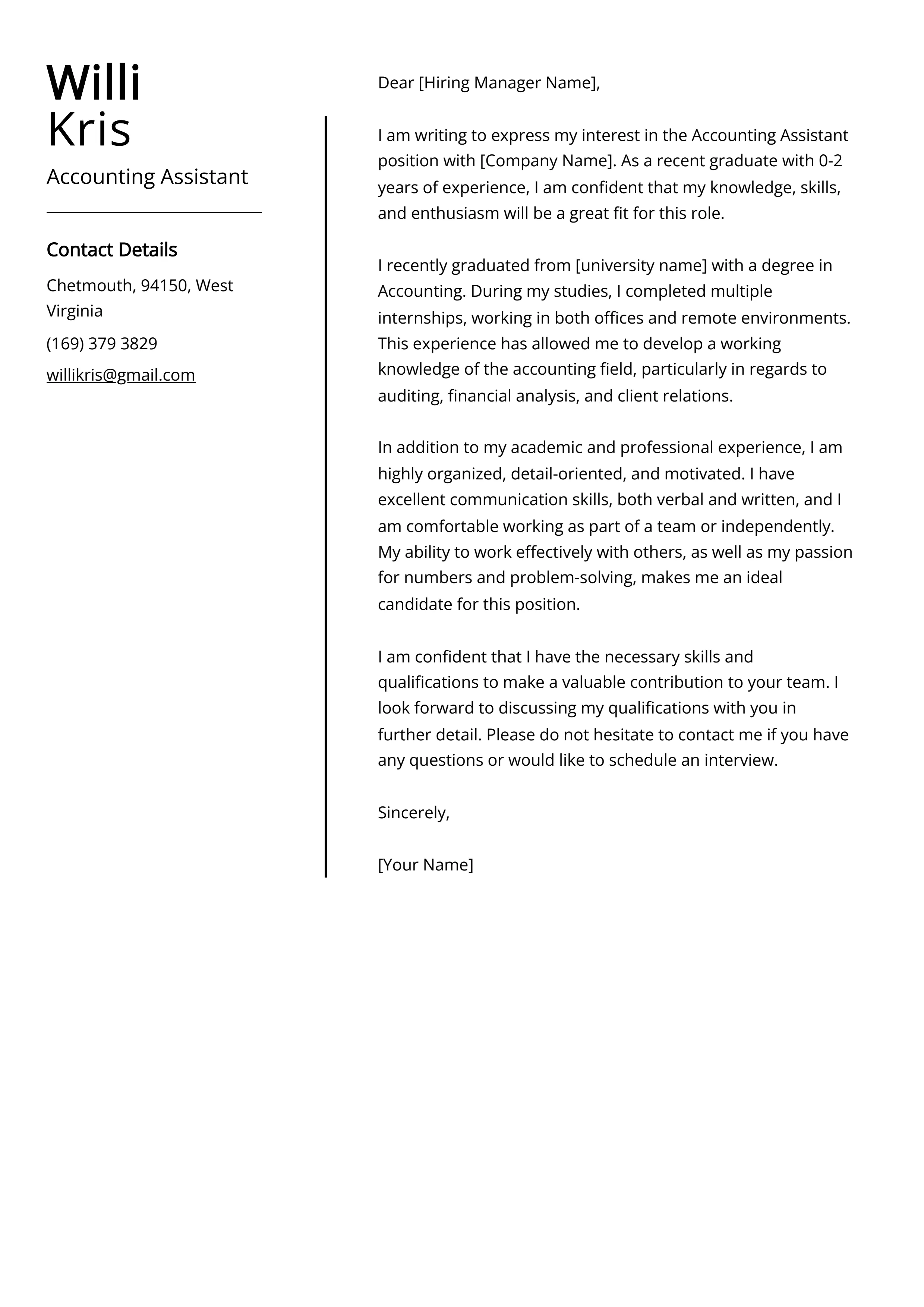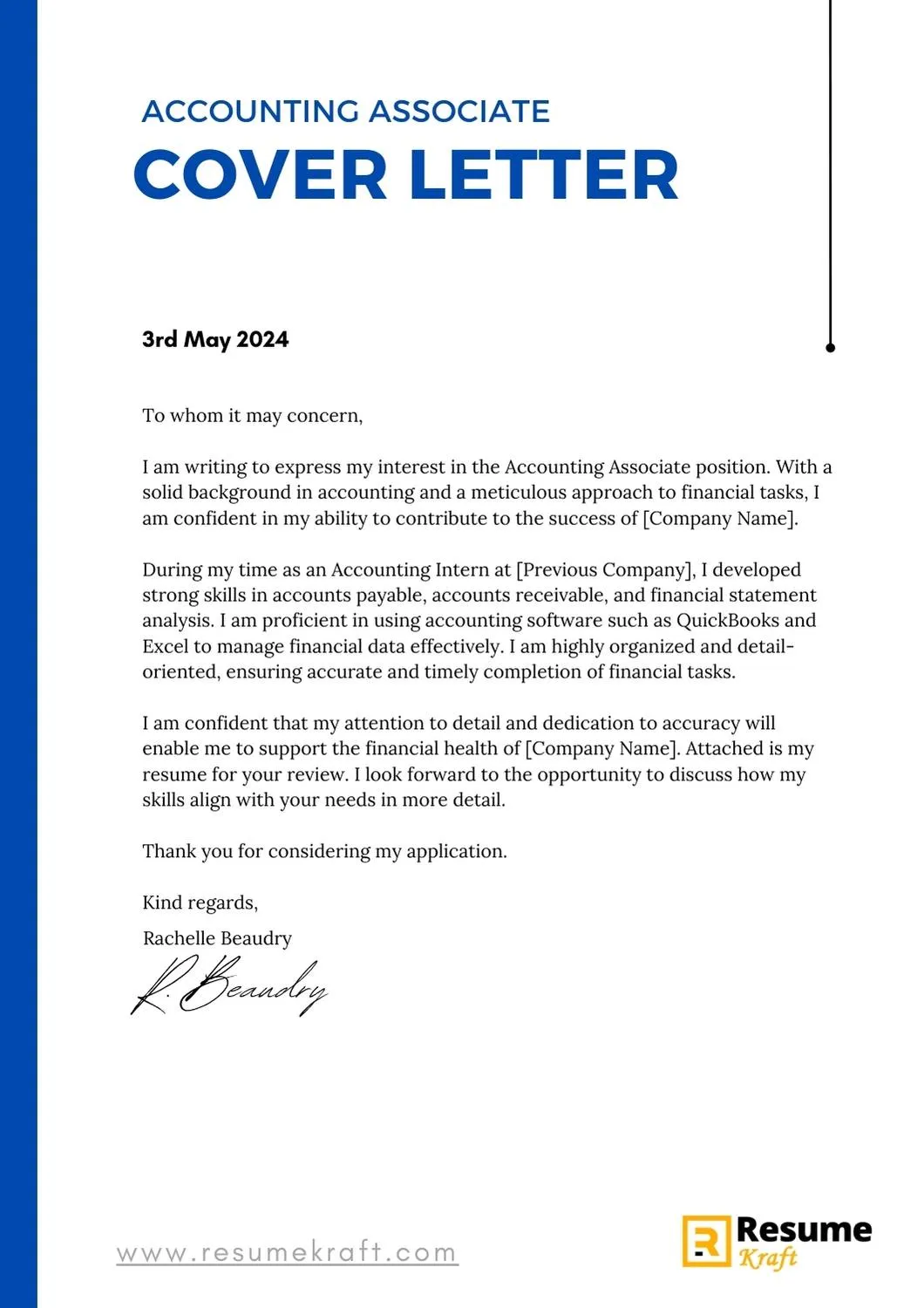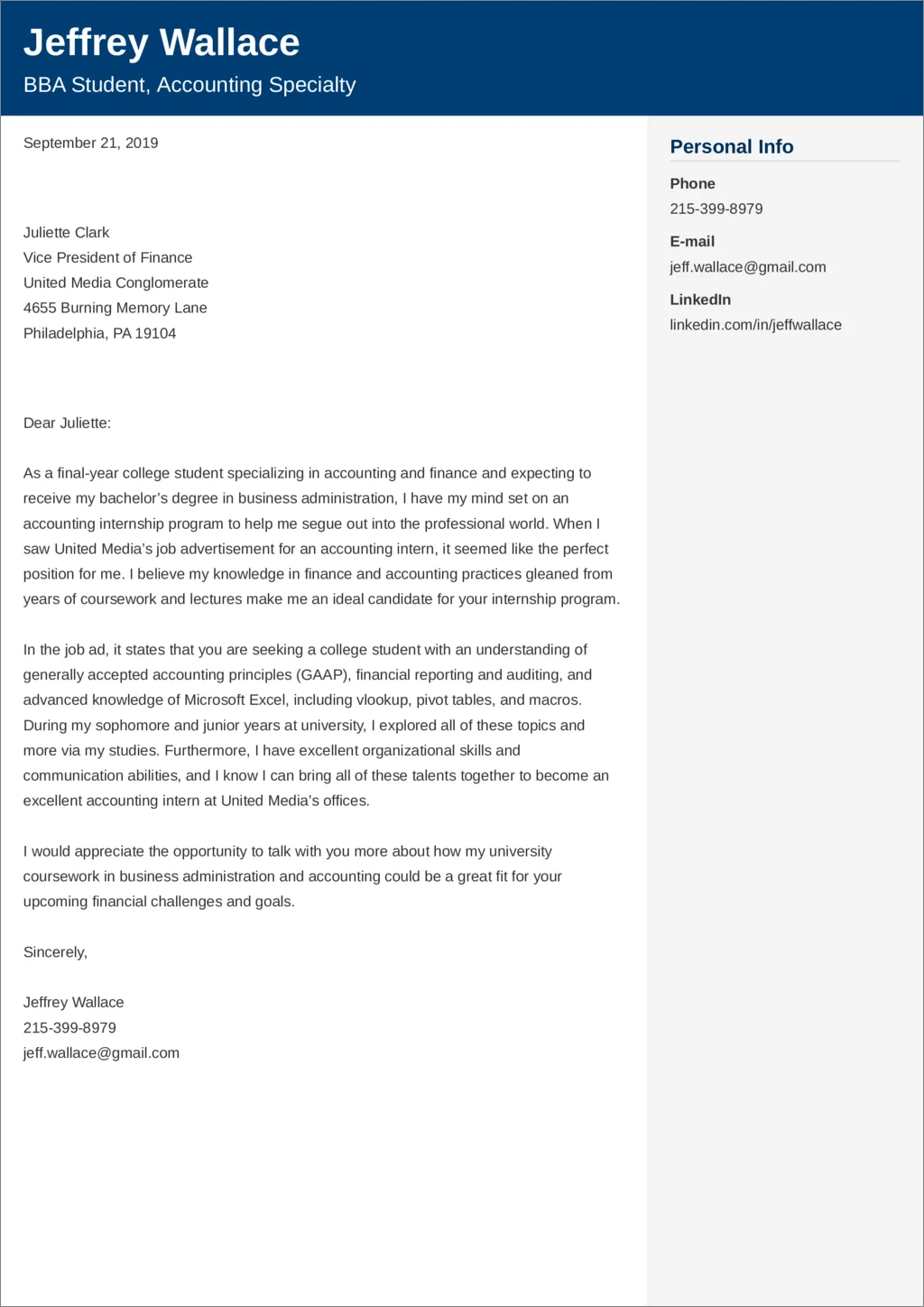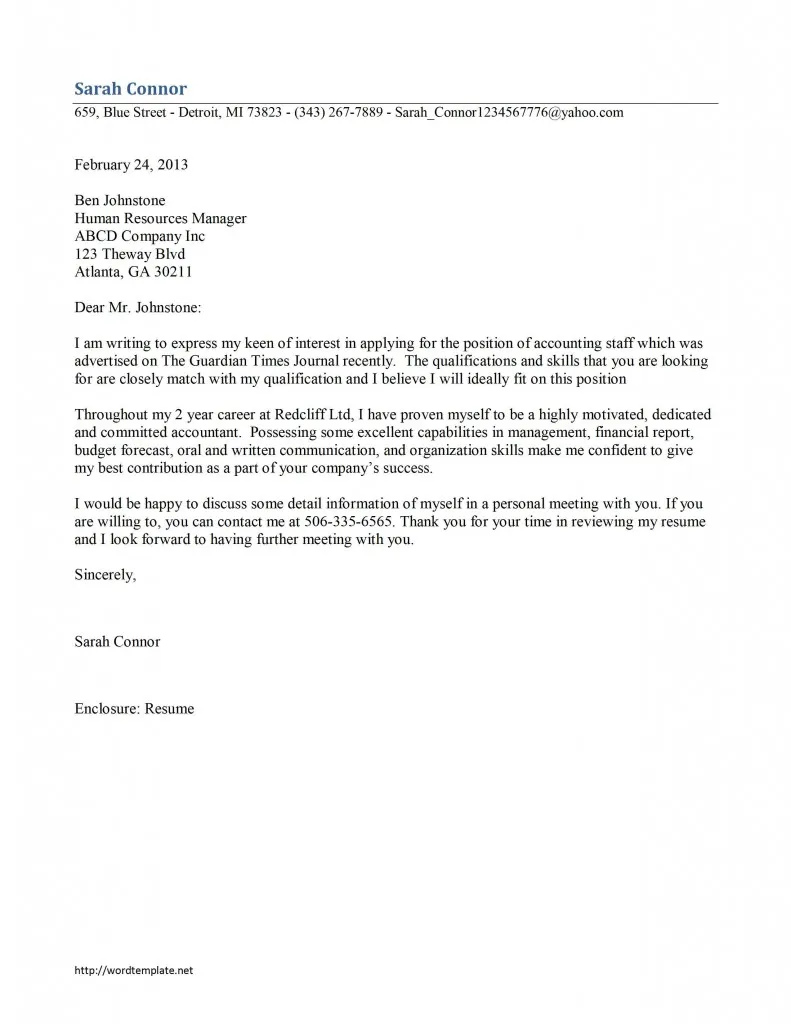Why an Accounting Cover Letter is Crucial
In the competitive world of accounting, a well-crafted cover letter is more than just a formality it is your first impression. It is your chance to showcase your personality, passion, and the unique value you bring to the table. Unlike a resume, which simply lists your qualifications, a cover letter allows you to tell a story. It provides context, explains your motivations, and highlights how your skills align with the specific requirements of the job and the company. A compelling cover letter can significantly increase your chances of securing an interview, setting you apart from other qualified candidates. It is an opportunity to demonstrate your communication skills, attention to detail, and understanding of the role.
Highlighting Your Skills and Experience
Your cover letter should be a spotlight on your most relevant skills and experiences. Don’t just rehash your resume; instead, elaborate on the experiences that make you the ideal candidate. Focus on the skills that the employer is seeking, such as proficiency in accounting software, experience with financial reporting, or expertise in tax regulations. Use specific examples to illustrate how you have successfully applied these skills in past roles. For instance, if you have experience with a particular accounting software, mention it and briefly describe how you used it to streamline processes or improve accuracy. If you have a proven track record of reducing costs or improving efficiency, quantify your achievements whenever possible. Emphasize your ability to analyze financial data, identify trends, and provide insightful recommendations.
Tailoring Your Cover Letter to the Job

Generic cover letters are easily spotted and often discarded. To truly impress, you must customize your cover letter for each job application. Carefully review the job description and identify the key requirements and desired qualifications. Then, tailor your letter to directly address these points. Highlight the skills and experiences that align with the specific needs of the role. If the job description emphasizes experience with a particular industry or type of accounting, be sure to showcase your relevant expertise. Demonstrate that you have taken the time to understand the position and the company. This level of personalization shows that you are genuinely interested in the opportunity and have the qualifications to succeed. This demonstrates your genuine interest and attention to detail.
Researching the Company
Before you start writing, conduct thorough research on the company you are applying to. Understand their mission, values, and recent activities. Visit their website, read news articles, and check their social media presence. This research will provide you with valuable insights into the company culture, their goals, and the specific challenges they face. This knowledge can be used to tailor your cover letter to demonstrate how your skills and experience align with their needs. Show that you understand their business and how you can contribute to their success. Mention specific projects, initiatives, or values that resonate with you and explain why you are excited about the opportunity to join their team. This demonstrates your proactive approach and genuine interest.
Formatting Your Accounting Cover Letter
The format of your accounting cover letter is just as important as its content. Choose a professional font, such as Times New Roman, Arial, or Calibri, and use a font size between 10 and 12 points. Keep the letter concise and easy to read, with clear headings, bullet points, and ample white space. Aim for a length of one page, as hiring managers often have limited time to review applications. Use a formal business letter format, including your contact information, the date, and the hiring manager’s name and title. Use a professional salutation, such as “Dear Mr. / Ms. [Last Name],” and a formal closing, such as “Sincerely” or “Best regards.” Ensure that your letter is free of grammatical errors, spelling mistakes, and typos. A well-formatted and error-free cover letter demonstrates your attention to detail and professionalism.
Essential Components of an Accounting Cover Letter

An effective accounting cover letter should include these essential components: Your contact information at the top, including your name, phone number, email address, and LinkedIn profile URL. The date and the hiring manager’s name and title, if known. A professional salutation, addressing the hiring manager by name if possible. An opening paragraph that captures the reader’s attention and states your purpose for writing. A body paragraph or two that highlights your relevant skills, experience, and accomplishments, tailored to the specific job requirements. A closing paragraph that reiterates your interest in the position, expresses your gratitude for their time, and includes a call to action. A formal closing, such as “Sincerely” or “Best regards,” followed by your typed name. Remember to always proofread the entire letter before submitting.
Writing a Compelling Opening
The opening paragraph of your cover letter is crucial for capturing the hiring manager’s attention. Start with a strong statement that immediately grabs their interest. Avoid generic openings such as “I am writing to express my interest.” Instead, try a more engaging approach, such as: Mentioning a specific accomplishment or skill that aligns with the job requirements. Referencing a mutual connection or a company event that caught your interest. Expressing your enthusiasm for the company and the role. Clearly state the position you are applying for and how you learned about the opportunity. Briefly summarize your key qualifications and why you are the ideal candidate. Make sure your opening paragraph sets a positive tone and encourages the reader to continue reading.
Showcasing Your Accomplishments
In your cover letter, showcase your accomplishments rather than just listing your responsibilities. Use the STAR method Situation, Task, Action, Result to structure your examples. Start by briefly describing the situation or context. Then, explain the task you were assigned or the problem you needed to solve. Detail the specific actions you took to address the situation. Finally, highlight the results you achieved, quantifying them whenever possible. For instance, instead of saying “Managed accounts payable,” say “Streamlined the accounts payable process, resulting in a 15% reduction in processing time and a $10,000 annual cost savings.” Provide concrete evidence of your successes to demonstrate your value to the employer. This will make your achievements more impactful and memorable.
Quantifying Your Achievements

Whenever possible, quantify your achievements to make them more impactful. Use numbers, percentages, and dollar amounts to demonstrate the positive outcomes you have achieved in previous roles. For example, instead of saying “Improved accuracy,” say “Improved accuracy by 20% through implementing new reconciliation procedures.” Quantifying your achievements helps hiring managers understand the tangible results you can deliver. Consider the following examples Increase sales revenue by X%, Reduce expenses by Y%, Improve efficiency by Z%, Save the company $A annually, Successfully manage a budget of $B. By providing specific metrics, you provide concrete evidence of your ability to drive results and contribute to the company’s bottom line. Quantifiable achievements will make your cover letter stand out from the competition.
Closing Your Cover Letter Effectively
Your closing paragraph should leave a lasting positive impression. Reiterate your interest in the position and the company, emphasizing how your skills and experience align with their needs. Express your gratitude for the hiring manager’s time and consideration. Include a clear call to action, such as requesting an interview or offering to provide additional information. Reiterate your contact information, making it easy for the hiring manager to reach you. Maintain a professional and enthusiastic tone. Thank them for their time, and express your excitement for the opportunity. A strong closing paragraph can significantly increase your chances of securing an interview. Ensure that you are available for a call or an interview.
Proofreading and Editing Your Cover Letter
Before submitting your cover letter, proofread and edit it meticulously. Errors can undermine your credibility and make you appear unprofessional. Check for grammatical errors, spelling mistakes, typos, and formatting inconsistencies. Read the letter aloud to catch any awkward phrasing or unclear sentences. Have a friend, family member, or career counselor review your letter for feedback. Pay close attention to the language, tone, and overall clarity. Ensure that your cover letter is free of jargon and easy to understand. A polished and error-free cover letter demonstrates your attention to detail and commitment to excellence. Proofreading and editing are crucial steps in ensuring your cover letter makes a positive impression and increases your chances of getting an interview. Make sure the letter is ready to impress!
